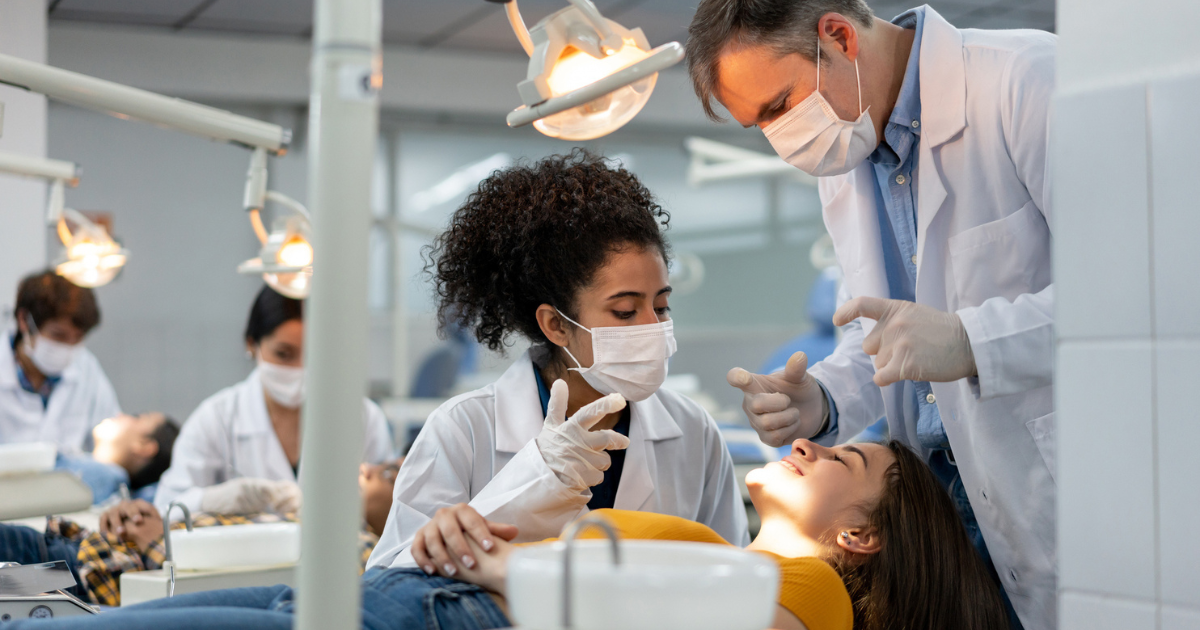As of July 1, all seven of California’s dental schools have been awarded grants by the CDA Foundation to support clinical rotations in health professional shortage areas.
California’s Office of Oral Health is partnering with the Foundation to administer the state’s project that CDA successfully advocated for in 2022, now funded by the California Healthcare, Research and Prevention Tobacco Tax Act of 2016, also known as the Proposition 56 Tobacco Tax. Dental schools are using these funds to expand their Community-Based Clinical Education rotation sites in underserved communities throughout the state. Eligible sites include federally qualified health centers and large private offices.
Implementation in action
The University of the Pacific Arthur A. Dugoni School of Dentistry and California Northstate University College of Dental Medicine were the first to use these funds to pilot clinical rotations, where students are gaining hands-on experience in health professional shortage areas. Designated by the U.S. Health Resources & Services Administration, dental HPSAs can be geographic areas, populations or facilities that have a shortage of primary, dental or mental health care providers and may include a significant low-income population.
The pilot programs have variations in administration, but each offers dental students the opportunity to work alongside staff dentists at the clinical sites to provide patient care and gain experience serving vulnerable populations, including people with special health care needs. Under dentists’ supervision, the students perform preventive and general dental procedures such as exams, cleanings, fillings and emergency care.
“Our dental students grow from the experiences they receive working with patients from a wide range of demographic and socioeconomic backgrounds and in these multidisciplinary clinics. These are also important opportunities for our program to be of service and raise awareness about unmet oral health needs across California,” said Elisa Chavez, DDS, interim dean of the Dugoni School of Dentistry.
Herman Ostrow School of Dentistry of USC, UCLA School of Dentistry, and Western University College of Dental Medicine have also recently opened clinics, making a total of 13 active rotation sites within California communities. Twelve more sites have been approved to serve patients in the near future.
Building bridges between communities and providers
Dental school CBCE rotation sites are assets for community health improvement. Partnerships with local health organizations are conduits for shared knowledge, resources and community engagement, fostering a practice-ready mindset for students by graduation. By extending dental services to underserved populations, the students play a vital role in improving access to dental care.
Marisa Watanabe, DDS, MS, Western University of Health Sciences, College of Dental Medicine’s associate dean for community partnerships and access to care, noted, “Students are requesting to volunteer additional time on weekends and even during their academic breaks, reflecting the strong relationships built with the clinic partners.”
She mentioned that one student who originally planned a career in private practice is now interested in federally qualified health centers after participating in the rotation program. “Western University’s goal was not only to build partnerships with community clinics but also to help our students build bridges in dental care access,” Dr. Watanabe said. “The CBCE grant program is helping us bring that vision to life.”
California Northstate University College of Dental Medicine’s director of community rotations, Mironda Frankenberger, DDS, shared, “Several students have reported a desire to pursue community dentistry post-graduation as a direct result of their experiences during community rotations. The CBCE grant has afforded our students an unmatched opportunity for growth as culturally humble and socially conscious healthcare providers and has strengthened CNU’s ties with those serving our most vulnerable patient populations.”
A preceptor who worked with CNU students spoke highly of the experience. “The students consistently demonstrate professionalism and eagerness to learn. Their presence has not only helped expand access to care for our patients but also fostered a collaborative learning environment that benefits our entire team.”
The preceptor added that dental students in Yuba City’s community clinics had a “profound positive impact on the community.”
“Patients witness the commitment of dental schools to training professionals with a strong sense of service, a practical understanding of market realities and a solid foundation in public health principles. This engagement builds trust within the community and inspires students to integrate these values into their future practices.”
Students recommend expanded learning options
The CBCE program prepares future dental professionals to meet the needs of an increasingly diverse society. By integrating service, empathy and community-mindedness into their training paradigms, California’s dental schools are helping students build a strong foundation for continued growth in cultural competency, alongside clinical excellence and social responsibility.
One student reflected, “The community rotations program was a great learning experience that enriches what students already have learned in clinic at school. My sites offered a different patient demographic compared to those seen at the campus clinic, and, as a result, the patients’ concerns and needs were slightly different. I was able to see patients with varying age ranges. The pediatric population helped immensely with my own skills as provider.”
“My rotation at WellSpace Community Dental Health was a fantastic experience,” another student shared. “I had the opportunity to complete my first root canal along with many extractions and fillings. The team was incredibly welcoming and kind, treating me with respect throughout my time there. I would highly recommend this rotation to future students, as it provided invaluable hands-on experience in a supportive environment. I would love to return and continue to serve the community!”
Richard Graham, DDS, CDA Foundation board chair, noted that the CBCE program reflects an important juncture in the evolution of the Foundation’s clinic work and addresses continuing changes in the care system. “We are showing how that system of care can be further expanded and improved,” Dr. Graham said.

